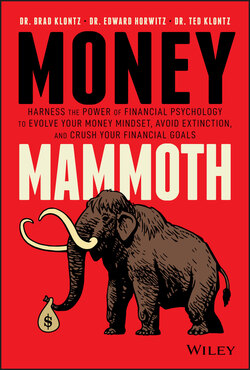Читать книгу Money Mammoth - Ted Klontz - Страница 25
DEATH TO SAVERS
ОглавлениеThe majority of us are just not wired to save. In a 2018 study published in Nature Communications titled “Differential Temporal Salience of Earning and Saving,” researchers Kesong Hu, Eve De Rosa, and Adam K. Anderson found that we are wired to pay more attention to earning than saving.2 They noted that “savings” are for future use, are currently inaccessible, and are abstract, which decreases our attention and motivation to save. In contrast, we are wired to focus more on earning or gaining money and possessions now, which is much more concrete. Not only are we wired to pay attention to immediate concrete gains versus long-term abstract savings, our ancestors survived by sharing what they had when they had it. Those who didn't share were sanctioned by the tribe, often quite dramatically—sometimes banished, sometimes publicly executed. The ultimate sanction was to be thrown out of the tribe, which was a prescription for certain death. The sharers survived, and so they passed on their sharing genes and became the dominant group with the trait of sharing.
In many contemporary settings, the bias toward sharing instead of saving for oneself is very much predominant. For example, this approach to resources is quite prominent in Appalachia, Native American tribes, many African American communities, poor neighborhoods, and others. Those members of the community who share what they have with others are venerated while nonsharers are sanctioned. An underlying premise is that “If I look out for you when you need help, then you will look out for me when I need help.” Each generation had its share of hoarders, but the majority of our ancestors, those individuals who survived, were those who had a sharing bias.
At this point, you may be wondering about your money beliefs. Where did they come from? Did they evolve from my ancestors thousands of years ago? How much of my financial behavior is hardwired and on auto pilot, and how much can I really control? Can I really fight genetic tendencies against saving, and if so, how? Can I become aware of my tendencies and correct them or am I doomed for financial extinction too? In the next chapter, we begin to explore those and many other questions, but first we need some Mammoth Insights to lead us on our journey.
